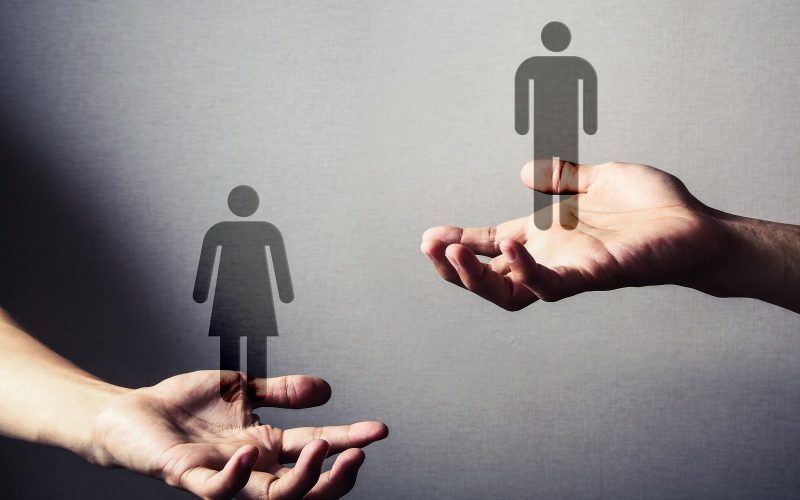Social comparison is as old as the human race and can be found in every stage of human life. It firsts springs up when children are very small, in the toddler days of wanting whatever toy is in the hands of the next child next to them.
It gradually gains momentum in elementary school when children follow fads, and it becomes noticeable when someone isn’t playing the same games or watching the same shows as everyone else.
High school, the universe of cliques, popular music, brand names and the “fear of missing out” is where social comparison pitches its tent.
And it never quite goes away as individuals focus on getting admitted into the better colleges, securing the better jobs, hooking up with and possibly marrying someone their friends might envy, and building a picture-perfect family with them. As soon as kids start rolling in, we rejoin the circle through them.
As adults, we encounter many of the same social comparison pressures as teens to one extent or the other: comparing our social status, material items, looks, and even our relationships.
This is a natural human dynamic, and it’s designed to enable us to live together as a cohesive group, to keep us from falling too far behind out capabilities, and it lets us learn from one another.
It also aids us in defining ourselves, to rate our performances in various areas of our life according to what appears to be possible, and in some cases, can help us to feel better about ourselves. However, it can also be stressful. And can make us more competitive than we need to be.
What studies say on Social Comparison?
There are two types of social comparison according to researchers. We have the upward social comparison where we attempt to feel better and more hopeful by looking at people we think are better off than we are, and downward social comparison where we strive to feel better about our situation and ourselves by looking at people who we think are worse off than we are.
Though at times, these comparisons can be less beneficial than we think they will be and sometimes, they are really bad for our stress levels and happiness; they aren’t always bad for us.
Some of the determinants of whether social comparisons are harmful or helpful are the kind of stressors we have in our lives, our self-esteem and whether we’re making downward or upward social comparisons.
People who have lesser stressor in their lives and higher self-esteem tend to fare better with social comparison. For instance, generally speaking, when we make downward social comparison and compare our present situation with those of someone we feel are less well-off, it usually makes us feel better.
Those who have higher self-esteem, however, experience a greater bump. Those who are experiencing greater stress or threats in their lives or are lower in self-esteem tend to use downward comparison more often, and this can elevate their mood, but not as much as it does to people who are already doing better in these areas.
Upward social comparison—comparing ourselves to people who are better off as a source of inspiration—can make us feel just that: inspired. Individuals who are dieting can use pictures of those who embody their physical goals and feel more motivated.
Those who are striving to excel academically can have a role model they strive to emulate, and feel clearer on their path to success.
However, when people who have recently encountered a setback or have lower self-esteem make an upward social comparison, it can make them feel worse, both experiencing a drop in mood and sometimes an increase in stress.
How we stress ourselves through social comparison?
Social comparison comes in a variety. In the most basic form, whenever there is a gathering of people, there’s the tendency of comparing ourselves and usually create some sort of hierarchy, unspoken or formal.
Clubs and organisations have officers who are elected, and awards are given to those with outstanding performance, and most people know the more influential members.
Mom’s forums compare their babies’ milestones and their relationships both in an attempt to measure their own success as moms and to make sure their children are progressing. From the high achievers to those in search of fun and friends, we tend to compare.
However, these comparisons can stress us as we may come off as competitive or conceited when we make downward social comparison and may find ourselves lacking when making upward social comparison, which can create stress in our relationships.
In the last several years, social media had taken social comparison to an entirely new level. We see someone who is doing what we’re not or what we wish to do, and we may become stressing wondering if our efforts are enough, wages are enough or if we’re enjoying life enough.
We compare our normal lives with other people’s curetted best memories, not wanting to know if they’re just posting their highlights and the best-edited photos out of thousands, or if they’re actually sharing spontaneous and casual events as they happen.
Either way, a lot of people discover that social media showcases social comparison in all the worst ways, making us feel worse about our situations, and studies seem to back this up.
This occurs in our casual, real-life scenarios as well, however. Have you noticed yourself feeling an iota of satisfaction when you hear someone else has fallen down a bit, going through some misfortune that that makes you feel luckier when you compare?
Conversely, have you found yourself feeling happy for a friend when they break their good news but fell a tiny jolt of regret for yourself that you’re not experiencing the same food fortune?
We’re wired this way in some ways as these feelings can be automatic at time, but we don’t need to allow our instincts toward social comparison be a significant part of who we are; we can reduce these tendencies and counteract them with a little effort, and as a result, feel less stressed by them.
However, the first step is being aware of social comparison in us and in others.
How competitive friends stress us?
Competitive friends can be beneficial if they’re competing against themselves and motivating us to compete against ourselves, or if they playfully drive us to achieve our goals but fall short of making us feel bad about ourselves in the numerous ways that competitive friends can drain our self-esteem.
If you think your friend is happy when you fail and upset when you succeed, if you feel judged, or you feel pushed too hard, this is not a friendship that is competitive in a good way.
Surely, it’s best to be friends with (and have friends) who are only delighted in the success of one another and to provide support rather than claim subtle superiority when friends encounter setbacks.
This can take a little effort, but by eliminating competitiveness and replacing it with camaraderie, we can save ourselves a lot of stress
The upside of comparison and competitiveness
There is a positive side to social comparison and competitiveness, of course. When all our friends are at their best, it inspires us to do well also, which is the upside of upward social comparison. (This is especially true if they share the secrets of their success.)
When we make the downward social comparison and compare ourselves to people who are worse off than we are, we tend to appreciate what we have. We realise that we could find ourselves in a worse situation. We feel more grateful and often times, we experience empathy too.
If we’re are striving to keep up with a successful friend or a role model, we often do better, and we can also improve ourselves by supporting others. Another good motivator can be the desire to avoid the embarrassment of failure.
The key difference between friendly competition and the competition of “frenemies” is the factor of supportiveness: true friends may support one another to succeed, but be aware that there’s no shame in falling short of the mark.
Frenemies seem to find joy in one-upmanship and the failure of others, while true friends aren’t fully delighted in their own success if their friends aren’t beside them, doing well too.
This pushes us to assist our friends to succeed, to be happy in their accomplishments, and to motivate them during tough times to keep fighting, which is a win for everyone.
How to break the shackles of negative social comparison?
If you find yourself in the snares of social comparison; beating yourself up when you compare yourself with those who are higher than you in achievement, or you feel somewhat entangled in feelings of superiority when you make downward social comparison, it’s vital to free yourself from this mental trap.
Here are some simple and effective ways you can teach your brain to care less about what others are thinking or doing:
Create a support circle
By creating and focusing on a circle of supportive people, you’ll find it easier to avoid frenemies and competitive friends.
This can be a set of friends who share the same goals. You can start an exercise group, a diet club, or another group that is centred on a goal that is formal or informal, or you can also join a structured group, or a training group at the local gym.
Find role models
You can gain the benefits of your role model’s success by working to keep up with their achievements (realising what works for them, their personal motivation, etc.) without including the element of competitiveness to your own relationships.
It’s better to learn from a role model like Elon Musk or Oprah Winfrey than to learn from someone in your circle of friends without ultimately feeling “less than” when they constantly achieve more.
Count your blessings
When you find yourself comparing your situation with someone else’s, try to “even the score” in your head. If you’re feeling judgmental, remind yourself of the strength of the other person and the significant things they bring to the table.
If you’re feeling envious of another person’s achievements, remind yourself of your own triumphs and strengths. Starting and maintaining a gratitude journal can also help, so you remain in the frame of mind of counting your blessings instead of pondering on what you don’t have.
This also allows you to stay focused on your own life and not the lives of others.
Partner up
You can also find a friend to share motivation with. Instead of a group, you and your “goal buddy” can check in with one another on your goals, motivate each other to stick with the plan, and celebrate successes together.
This is especially beneficial as it provides you both with individualised moral support, a bit of added responsibility not to derail from the plan (or you’ll be yourself and your partner down), and it makes celebrating little victories a bit more fun.
Avoid frenemies
If there are people in your circle who constantly compare and judge, its okay (and even advised) to avoid them.
You may find it difficult to cut them out of your life completely, but you can reduce contact, and when you do see them, you can steer the conversation to neutral topics. You can also overcome the tendencies of competitive comparison in yourself, and they may follow in kind.
Cultivate altruism
There are numerous benefits of altruism , so cultivating it as a habitual pattern of thinking can be even better for you than for those who gain from your kindness.
See what little stuff you can do for your friends and strangers. Practice loving-kindness meditation. You won’t feel prone to compare when you are your best self.





